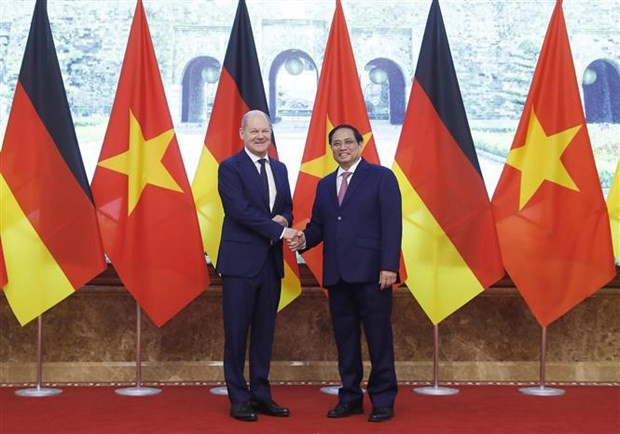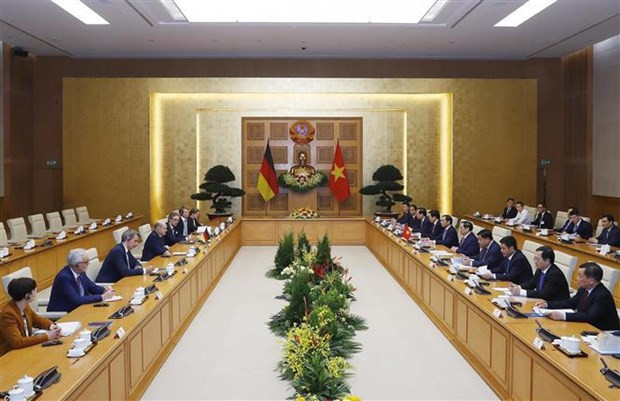
PM Chinh said the Chancellor's official visit to Vietnam on November 13 - 14 was of great importance to bringing the bilateral relations to a new phase of development, enhancing political trust, intensifying the strategic partnership, and strengthening cooperation in bilateral and multilateral aspects towards sustainable development and joint settlement of global issues.
Chancellor Scholz affirmed that Germany attaches importance to Vietnam’s position and role in its Indo-Pacific strategy and supports the strong promotion of the traditional relations and cooperation.
The two leaders expressed their delight at the progress in the bilateral relations despite the COVID-19 pandemic’s impacts as seen in frequent meetings between senior leaders of Vietnam and Germany; the vigorous growth in bilateral investment and trade, which has turned Vietnam into the largest trading partner of Germany in Southeast Asia; and the recent signing of cooperation documents on defence, energy transition, and labour. They also highly valued bilateral collaboration in COVID-19 prevention and control.
PM Chinh thanked the German Government and people for their donation of COVID-19 vaccine, which have helped Vietnam contain the pandemic, reopen borders, and recover the economy early. Meanwhile, Chancellor Scholz noted he was impressed with Vietnam’s recovery and dynamic economic development.
Regarding major directions and measures to comprehensively foster the bilateral cooperation, the two sides agreed to increase the exchange of visits at all levels and through all channels such as the Parties, States, Governments, and parliaments while continuing to effectively carry out bilateral cooperation mechanisms.
They promised to encourage Vietnamese and German agencies and enterprises to continue fully and effectively implementing the EU - Vietnam Free Trade Agreement (EVFTA).

For his part, Chancellor Scholz noted the EVFTA is an important impulse for bilateral economic and trade links. He called on both countries to continue diversifying their economic relations and voiced his hope for the early ratification of the EVIPA.
He applauded Vietnam’s efforts to achieve a sustainable fishery sector, stressing that German enterprises are paying increasing attention to Vietnam, which boasts political stability and an optimal investment and business environment, especially in such areas as renewable energy, manufacturing industry, and infrastructure development.
Both host and guest agreed to expand the bilateral cooperation to other important spheres like science - technology, defence - security, health care - education, vocational training and labour.
Vietnam and Germany will step up coordination to jointly address global challenges such as food security and climate change response, and work with the G7 nations so that the parties concerned will soon reach consensus on a political declaration on the Just Energy Transition Partnership (JETP) on the basis of guaranteeing harmonious interests, they said.
PM Chinh suggested the German Government to continue assisting and providing favourable conditions for the Vietnamese community to integrate successfully into the local society and contribute to Germany’s socio-economic development as well as the bilateral ties.
At the talks, the two leaders also discussed regional and international issues of common concern.
They affirmed that Vietnam and Germany will continue close coordination and mutual support at international forums and organisations, especially in promoting the Association of Southeast Asian Nations (ASEAN)’s relations with Germany and the EU, and strengthening bilateral cooperation within the framework of the Asia - Europe Meeting (ASEM) and the United Nations.
The two leaders reaffirmed the importance of ensuring peace, stability, security, safety, and freedom of navigation and overflight in the East Sea, and peacefully resolving disputes in accordance with international law and the 1982 UN Convention on the Law of the Sea (UNCLOS).
Following the talks, the two leaders met with the press to inform about the main outcomes of their talks.
Vietnamese, German government leaders meet with press in Hanoi
Prime Minister Pham Minh Chinh and German Chancellor Olaf Scholz met with the press after their talks in Hanoi on November 13 afternoon.
PM Chinh reaffirmed that the Chancellor’s visit is of great significance, marking the two countries' relations entering a new stage of development, creating momentum to deepen the Strategic Partnership, expanding bilateral cooperation for sustainable development, jointly solving global issues, for peace, cooperation and development in the region and in the world.
He told the press that on the threshold of and during the visit, the two countries’ agencies have completed procedures and signed three cooperation documents on defence, energy transition, and labour and vocational training.
In the spirit of mutual trust and understanding, the two sides comprehensively reviewed the multifaceted collaboration, agreed on major directions and measures to improve cooperation efficiency and expand to other fields, and exchanged views on regional and international issues of mutual concern, PM Chinh stated.
The PM said that he had proposed the German Government encourage German businesses to invest in Vietnam in the fields where Germany has strength such as digital transformation, green transformation, renewable energy, strategic infrastructure, and manufacturing; and urge the European Commission’s removal of its ‘yellow card’ warning against Vietnamese aquatic products exports, given the nation’s strict implementation of the commission’s recommendations related to illegal, unreported and unregulated (IUU) fishing towards sustainable fishery development.
The two leaders reiterated the importance of ensuring peace, stability, security, safety and freedom of navigation and aviation in the East Sea; settling disputes via peaceful measures on the basis of international law, especially the 1982 UN Convention on the Law of the Sea (UNCLOS), he said.
Chancellor Scholz stated that Vietnam is a very important partner of the German government and businesses, especially since the European Union-Vietnam Free Trade Agreement (EVFTA) took effect in 2020.
As Vietnam is one of the countries hard hit by climate change, Germany wants to support the country in achieving its goal of reducing net carbon emissions, he said, adding that energy dialogues between the two countries, launched in 2022, have created a basis for them to exchange opportunities and challenges.
The Chancellor also stressed that Germany also supports Vietnam in ASEAN activities, thus further promoting the cooperative partnership between Germany and ASEAN. He expressed his expectation for the first EU-ASEAN summit to be held in Brussels, Belgium, next month./. VNA